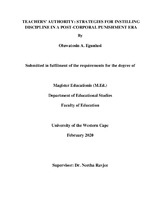Teachers' authority: Strategies for instilling discipline in a post-corporal punishment era
Abstract
This research explores the relationship between authority and discipline in South African schools. During apartheid, corporal punishment was used as an authoritarian mode of discipline. The new democratic Constitution, which guarantees the right to dignity, equality, freedom and security for all citizens, led to legislation that outlawed corporal punishment: Section 10 of South African Schools Act 84 of 1996 prohibits the practice of corporal punishment in schools. The banning of corporal punishment leaves schools with the responsibility of implementing disciplinary practices to make learners feel emotionally comfortable and physically safe to develop self-discipline.
However, recent research suggests that educators link the growing problem of indiscipline in many schools to the banning of corporal punishment and inadequate alternative disciplinary practices. Some teachers struggle to implement disciplinary alternatives to corporal punishment. Others argue that teachers find it difficult to liberate their teaching approaches from the restrictions of the past; they struggle to be in authority without being authoritarian. Many teachers still confuse the use of „authority‟ with being „authoritarian‟, and shy away from exercising their authority at all. Educators find it difficult to manage discipline in classrooms.
Yet the task of nurturing serious scholars and responsible citizens may be difficult in schools with discipline problems. Therefore, this qualitative case study of a Cape Town high school investigates the puzzle of authority in the post-apartheid classroom. It seeks to better understand teachers‟ authority in managing classroom discipline in the post-corporal punishment era.
The main research question is: How do teachers in the selected Cape Town high school understand discipline and authority in the post-corporal punishment era? The findings suggest that educators may offer a vision of classroom leadership in schools that addresses teachers‟ authority outside of the mechanical and punitive forms of control. The study shows that experienced teachers are more knowledgeable about the concept of authority compared to novice teachers. Experienced teachers are aware of what teachers‟ authority entails and what is needed for the effective exertion of teachers‟ authority, while some novice teachers confuse „authority‟ with „being authoritarian‟ and therefore struggle to exert their authority in the classroom.

